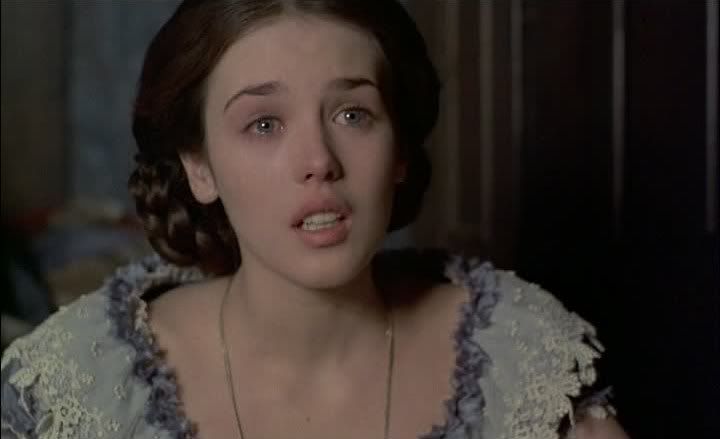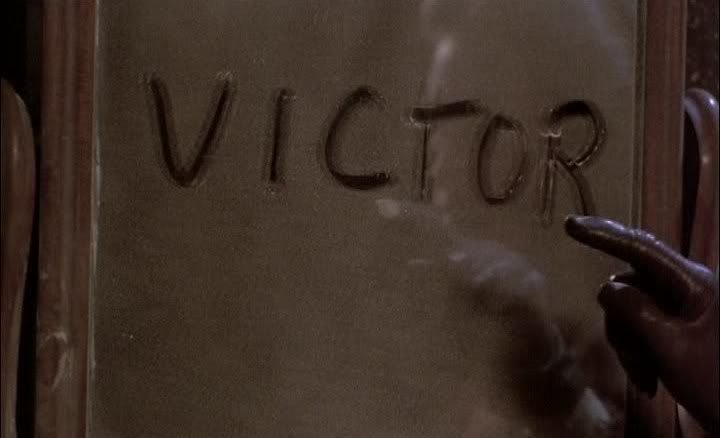
François Truffaut's The Story of Adèle H. is a study of romantic obsession and madness, an intensely focused character study about the disintegration of a young woman's mind in the wake of a failed romance. Based on the diary of Adèle Hugo (Isabelle Adjani), the daughter of French writer Victor Hugo, the film concerns Adèle's desperate and unrequited love for the British lieutenant Albert Pinson (Bruce Robinson). Adèle follows Pinson to Halifax in Canada, where he deploys with the army during the American Civil War. She begins stalking and pursuing the chilly, disinterested lieutenant, who's earned a reputation as a womanizer and a spendthrift, amassing gambling debts and bedding many women while Adèle pines hopelessly for him.
Truffaut relates the story of Adèle's descent into madness with a simple, direct style, chronicling without ornament or sentiment the increasing desperation and sorrow of this young girl who suffers for her love, chasing a man who clearly has no interest in her anymore, who has already gotten all he ever wanted from her. The film's style is bleak and dry, and Néstor Almendros' images are restrained to a flat color palette of grays and browns, capturing the increasingly constricted and miserable world that Adèle, so focused on her love, barely even notices around her. The film is overly literary, tied, like many of Truffaut's films, to its script, and to the excerpts from Adèle's letters and journals, which she often reads in voiceover. The film often feels bogged down by words, by letters passing back and forth, and if not for the remarkable performance that Truffaut gets from his lead actress, there would be little to hold onto here.
The film is driven by Adjani's exceptional performance as the miserable Adèle. Adjani possesses a fragile, crystalline beauty that, as the film progresses, becomes increasingly pale and wispy, her skin the shade of paper, her eyes strained by her constant tears. She carries the film's full emotional weight, perfectly capturing the intense suffering of this lovesick woman. Adèle's misery could seem simply pathetic if Adjani's performance were not so raw and sensitive, so totally committed to conveying this young woman's passion and her pain. As she becomes more and more unhinged, she begins to look like a ghost, dressed in rags, unable any longer to disguise her madness behind the appearances of a respected young lady.
Adjani is a powerful central presence, gradually revealing more and more of her tormented inner life as the script slowly peels back the layers of her insanity. There are indications that Adèle's mind isn't especially stable even before her fruitless pursuit of Pinson definitively shatters her mental well-being. When someone tells Adèle that she must have been unhappy when her older sister died, she replies, "everyone in the family adored her," a non-answer that suggests her ambivalent feelings about the sister who looked so much like her but seemingly had her life much more in order than the obsessive, lonely Adèle. Adèle is haunted by dreams in which she's drowning, as though she identifies with her sister, who died so dramatically with her loving husband, unable to save her, drowning along with her. It seems as though Adèle almost envies this romantic tragedy, haunted by the knowledge that her dead sister not only was favored by the family, but possessed the true, intense, passionate love that Adèle herself so desperately desires.

Adèle's infatuation with Lieutenant Pinson causes her to profoundly disconnect from reality, concocting such an elaborate series of lies and distortions that it's soon not clear what she actually believes. While she fruitlessly pursues the lieutenant, she sends dispatches back to her concerned family in which she makes it seems as though she and Pinson are in love and preparing to be married. Adèle is so immersed in her love that she's detached from reality, at once knowing that Pinson will never marry her and yet clinging to an impossible, unrealistic hope that he will change his mind. Her love drives her to some rather pathetic behavior: she tells Pinson that if he marries her, she will allow him to continue seeing other women, and at one point she even hires a prostitute and sends her to Pinson for the night, though Truffaut discreetly cuts to black before revealing if Pinson accepted this outrageous gift or not. Adèle even considers hiring a hypnotist to hypnotize Pinson into marrying her, though she abandons this possibility when the hypnotist is revealed as a fraud.
Truffaut occasionally shifts the film's focus off of Adèle to clumsily discourse on her father. At one point, a doctor discovers Adèle's identity and explains, mostly to the audience, just who Victor Hugo is and why he's so important, delivering an exposition-laden speech about the great man's literary talent and political beliefs, as well as a condensed version of his biography. It's obvious that Truffaut wanted to present this miniature essay on Hugo, to express his admiration for the author who had been exiled for his convictions, but this material has been shoehorned in here, its tone forced and unconvincing. The same goes for the voiceover at the end of the film, in which a narrator abruptly steps in to describe what happens to Adèle after the film ends, as well as to discuss the death of Victor Hugo and the mourning for the great man across all of France. Most of the film is so resolutely focused on internality and emotion that these diversions into historical context, these odes to Hugo, feel very out of place.
The film as a whole is often interesting, thanks mainly to Adjani's strong performance, but it's also a curiously flat affair, anchored by that searing central performance and not much else. It's never clear why Truffaut thinks this story is so important, though the great import placed on Adèle's parentage raises the disturbing possibility that Truffaut is telling the story mainly because of his admiration for Victor Hugo, rather than because he finds Adèle herself so compelling. It's a study of emotional breakdown, but though Adjani commits completely to this role and powerfully conveys her character's fragmentation, it never feels like the film as a whole is as committed to these intense emotions as the actress is. Truffaut retains his distance, resting the film so completely on the actress that in the end, it's only her performance that makes an impact rather than the character or the story, let alone any ideas or themes that might arise from this tale.

2 comments:
While I completely agree with your characterization of Truffaut's direction, I actually quite like the detached quality and sometimes digressive approach. For me, the film has a vibe which goes with Pinter's wonderful script to French Lieutenant's Woman (not at all to be found in the dull realization of it). I guess one could also argue why the camera should have no empathy. So I rate this movie pretty high.
The detached quality resuts from the fact that Truffaut failed to get to first base with Adjani -- though lord knows he wanted to. HHer resistance helped him enormously. He called her "James Dean comeback as a girl."
It's my favoirte Truffaut film
Post a Comment